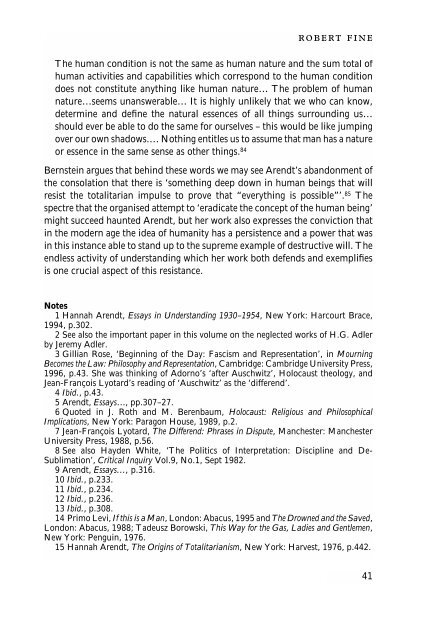You also want an ePaper? Increase the reach of your titles
YUMPU automatically turns print PDFs into web optimized ePapers that Google loves.
obert fine<br />
The human condition is not <strong>the</strong> same as human nature and <strong>the</strong> sum total of<br />
human activities and capabilities which correspond to <strong>the</strong> human condition<br />
does not constitute anything like human nature… The problem of human<br />
nature…seems unanswerable… It is highly unlikely that we who can know,<br />
determine and define <strong>the</strong> natural essences of all things surrounding us…<br />
should ever be able to do <strong>the</strong> same for ourselves – this would be like jumping<br />
over our own shadows.… Nothing entitles us to assume that man has a nature<br />
or essence in <strong>the</strong> same sense as o<strong>the</strong>r things. 84<br />
Bernstein argues that behind <strong>the</strong>se words we may see Arendt’s abandonment of<br />
<strong>the</strong> consolation that <strong>the</strong>re is ‘something deep down in human beings that will<br />
resist <strong>the</strong> totalitarian impulse to prove that “everything is possible”’. 85 The<br />
spectre that <strong>the</strong> organised attempt to ‘eradicate <strong>the</strong> concept of <strong>the</strong> human being’<br />
might succeed haunted Arendt, but her work also expresses <strong>the</strong> conviction that<br />
in <strong>the</strong> modern age <strong>the</strong> idea of humanity has a persistence and a power that was<br />
in this instance able to stand up to <strong>the</strong> supreme example of destructive will. The<br />
endless activity of understanding which her work both defends and exemplifies<br />
is one crucial aspect of this resistance.<br />
Notes<br />
1 Hannah Arendt, Essays in Understanding 1930–1954, New York: Harcourt Brace,<br />
1994, p.302.<br />
2 See also <strong>the</strong> important paper in this volume on <strong>the</strong> neglected works of H.G. Adler<br />
by Jeremy Adler.<br />
3 Gillian Rose, ‘Beginning of <strong>the</strong> Day: Fascism and Representation’, in Mourning<br />
Becomes <strong>the</strong> Law: Philosophy and Representation, Cambridge: Cambridge University Press,<br />
1996, p.43. She was thinking of Adorno’s ‘after Auschwitz’, <strong>Holocaust</strong> <strong>the</strong>ology, and<br />
Jean-François Lyotard’s reading of ‘Auschwitz’ as <strong>the</strong> ‘differend’.<br />
4 Ibid., p.43.<br />
5 Arendt, Essays…, pp.307–27.<br />
6 Quoted in J. Roth and M. Berenbaum, <strong>Holocaust</strong>: Religious and Philosophical<br />
Implications, New York: Paragon House, 1989, p.2.<br />
7 Jean-François Lyotard, The Differend: Phrases in Dispute, Manchester: Manchester<br />
University Press, 1988, p.56.<br />
8 See also Hayden White, ‘The Politics of Interpretation: Discipline and De-<br />
Sublimation’, Critical Inquiry Vol.9, No.1, Sept 1982.<br />
9 Arendt, Essays…, p.316.<br />
10 Ibid., p.233.<br />
11 Ibid., p.234.<br />
12 Ibid., p.236.<br />
13 Ibid., p.308.<br />
14 Primo Levi, If this is a Man, London: Abacus, 1995 and The Drowned and <strong>the</strong> Saved,<br />
London: Abacus, 1988; Tadeusz Borowski, This Way for <strong>the</strong> Gas, Ladies and Gentlemen,<br />
New York: Penguin, 1976.<br />
15 Hannah Arendt, The Origins of Totalitarianism, New York: Harvest, 1976, p.442.<br />
41

















